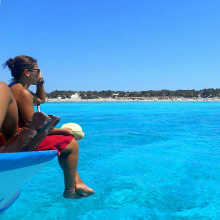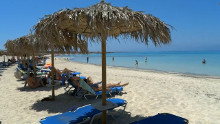
Advertisments
Find us on Facebook
Advertisments
 1.Do not swim too far from the coast. You must think that the return is more tedious.
1.Do not swim too far from the coast. You must think that the return is more tedious.- 2.It is safer to swim with friends.
- 3.Have you eaten? Wait 2-3 hours to swim. However, avoid to enter to water completely fasting.
- 4.Keep in mind that alcohol and swimming are a dangerous combination.
- 5.Avoid diving in areas that you do not know the depth or the shape of the seabed or in areas with rocks and stones.
- 6.Non-pushing and immerse other people in the sea.
- 7.Avoid swimming, when the weather is bad or there are large sea waves and strong currents.
- 8.Avoid swimming alone at night. Have a swimmer near you and always make sure that you have eye contact with him.
- 9.If you feel chills or dizziness if you are afraid or feel cold immediately come out from the sea.
- 10.Did you observe that you have drifted by the stream? Do not panic: See where the wind blows, turn your mouth and your nose in the opposite direction, and swim to approach the shore.
Did you notice that the current is parallel to the coast? Swim with it, approaching the beach at an angle.
- 11.Do you feel danger? Call for help.
- 12.Are you tired of swimming? Do not panic. Stay on the surface horizontally and keep calm. Swim again when rest.
- 13.Suffer by cramp? Do not be afraid. Relax the body part that "caught" and swim to shore slowly.

- 14.If there are buoys showing the boundaries outside of which the cruisers are allowed to move, do not swim beyond. There is a risk of getting hit.
- 15.Was raised from the lifeguard red danger flag? Get out of the water quickly. The red flag may mean that the waves or currents have become very dangerous, there is pollution in the sea or that lurks another danger.
- 16.Did you notice a swimmer who request assistance or he is in danger? Call for help, try to find a floating object (if any) and throw it to him for helping him keep on the surface.
If you approach the victim (or you are already near him), have in mind that you are in danger too if you get caught up violently and abruptly.
- 17.Did seawater come in your ear? If you have seawater in your ear, avoid getting anything into the ear canal, such as a pen, fingers, cotton swabs, etc. This can damage the thin lining of the ear and increase the risk of infection.
Pull or shake the earlobe over and over while tilting the head down to the shoulder. Try also to shake your head from one side to the other.
- 18.Did you sting by a jellyfish or medousa? There is no reason to panic! Read the following and fearlessly continue your vacation:
Symptoms after a spur-contact with jellyfish or medousa:
- Pain like burning (sometimes intense).
- Redness of the skin.
- In some cases reflected on the skin part of the jellyfish or medousa.
How can you deal with such a prick?
- Rinse the sting area with plenty of seawater. Avoid to use fresh water because it may activate any stings that are left on your skin.
- Rub softly with ammonia ( liquid or stick), on the wound. If you dont have ammonia, you can use alcohol or vinegar. Put to the skin powder or shaving foam. After some time, rinse the powder or the foam with water.
- If someone suffer from anaphylactic shock because of the sting, immediately request medical assistance and put the patient to lie down, having the bitten limb unmoving, at a level lower than his heart
 1.Do not swim too far from the coast. You must think that the return is more tedious.
1.Do not swim too far from the coast. You must think that the return is more tedious.




